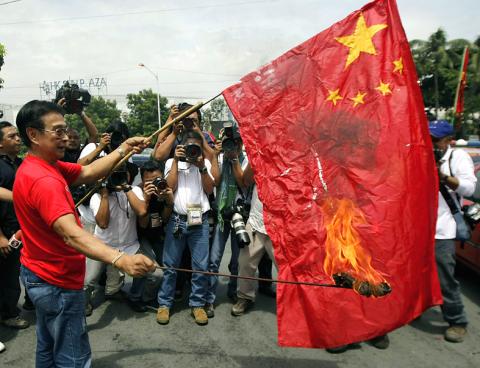The Philippines has taken China to a UN tribunal to challenge its claim to most of the South China Sea, including territory belonging to the archipelago, Philippine Secretary of Foreign Affairs Albert del Rosario said yesterday.
Del Rosario told reporters that Manila had referred Beijing to an arbitration panel under the UN Convention on the Law of the Sea (UNCLOS) — a 1982 treaty signed by both countries — and would ask it to declare Chinese claims in the area invalid.
“The Philippines has exhausted almost all political and diplomatic avenues for a peaceful negotiated settlement of its maritime dispute with China,” he said.

Photo: EPA
“On numerous occasions, dating back to 1995, the Philippines has been exchanging views with China to peacefully settle these disputes. To this day, a solution is still elusive,” Del Rosario added. “We hope that the arbitral proceedings shall bring this dispute to a durable solution.”
China’s territorial claims overlap those of the Philippines, as well as Taiwan, Brunei, Malaysia and Vietnam.
Over the past two years the Philippines and Vietnam have complained about China’s increasing assertiveness in enforcing those claims, particularly around areas believed rich in oil and natural gas reserves.
Manila says the Chinese stance led to a standoff last year with the Philippines over rich fishing grounds around the Scarborough Shoal (Huangyan Island, 黃岩島), a formation much closer to the Philippine coast than to China’s shores.
The Philippines in its submission says Beijing’s so-called “nine-dash line” outlining its territorial claims over most of the sea, including waters and islands close to its neighbors, is illegal, according to Del Rosario.
It also demands that China “desist from unlawful activities that violate the sovereign rights and jurisdiction of the Philippines under the 1982 UNCLOS,” he added.
A briefing paper provided by the Philippine foreign department alleged that within the nine-dash line, “China has also laid claim to, occupied and built structures on certain submerged banks, reefs and low-tide elevations that do not qualify as islands under UNCLOS, but are parts of the Philippine continental shelf, or the international seabed.”
China swiftly dismissed the submission, with Chinese Ambassador to the Philippines Ma Keqing (馬克卿) repeating her country’s stance to an official in the Philippines’ foreign office.
“Ambassador Ma reiterated the principled position of the Chinese side, and stressed that China has indisputable sovereignty over the islands in [the] South China Sea and its adjacent waters,” a Chinese embassy statement said.
“The Chinese side strongly holds [that] the disputes on [the] South China Sea should be settled by parties concerned through negotiations,” it added.
UNCLOS generally requires both parties to undergo arbitration and it was unclear if and when the UN would act, given China’s stance. However, a source said there were examples where cases had been heard with only one side present.
Rene de Castro, a political science professor at Manila’s De La Salle University, said the Philippines’ submission was a last throw of the dice and unlikely to force Beijing’s hand.
“I don’t think China will bite the bait. It has been consistent with its position that territorial disputes ought to be solved bilaterally,” De Castro said.
“We have exhausted all our options and we’re scraping the barrel, really,” he added.

The CIA has a message for Chinese government officials worried about their place in Chinese President Xi Jinping’s (習近平) government: Come work with us. The agency released two Mandarin-language videos on social media on Thursday inviting disgruntled officials to contact the CIA. The recruitment videos posted on YouTube and X racked up more than 5 million views combined in their first day. The outreach comes as CIA Director John Ratcliffe has vowed to boost the agency’s use of intelligence from human sources and its focus on China, which has recently targeted US officials with its own espionage operations. The videos are “aimed at

STEADFAST FRIEND: The bills encourage increased Taiwan-US engagement and address China’s distortion of UN Resolution 2758 to isolate Taiwan internationally The Presidential Office yesterday thanked the US House of Representatives for unanimously passing two Taiwan-related bills highlighting its solid support for Taiwan’s democracy and global participation, and for deepening bilateral relations. One of the bills, the Taiwan Assurance Implementation Act, requires the US Department of State to periodically review its guidelines for engagement with Taiwan, and report to the US Congress on the guidelines and plans to lift self-imposed limitations on US-Taiwan engagement. The other bill is the Taiwan International Solidarity Act, which clarifies that UN Resolution 2758 does not address the issue of the representation of Taiwan or its people in

US Indo-Pacific Commander Admiral Samuel Paparo on Friday expressed concern over the rate at which China is diversifying its military exercises, the Financial Times (FT) reported on Saturday. “The rates of change on the depth and breadth of their exercises is the one non-linear effect that I’ve seen in the last year that wakes me up at night or keeps me up at night,” Paparo was quoted by FT as saying while attending the annual Sedona Forum at the McCain Institute in Arizona. Paparo also expressed concern over the speed with which China was expanding its military. While the US

SHIFT: Taiwan’s better-than-expected first-quarter GDP and signs of weakness in the US have driven global capital back to emerging markets, the central bank head said The central bank yesterday blamed market speculation for the steep rise in the local currency, and urged exporters and financial institutions to stay calm and stop panic sell-offs to avoid hurting their own profitability. The nation’s top monetary policymaker said that it would step in, if necessary, to maintain order and stability in the foreign exchange market. The remarks came as the NT dollar yesterday closed up NT$0.919 to NT$30.145 against the US dollar in Taipei trading, after rising as high as NT$29.59 in intraday trading. The local currency has surged 5.85 percent against the greenback over the past two sessions, central